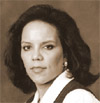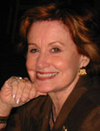- Categories:
Threats to Press Freedom Focus of BEA Panel
|
|
A distinguished panel of journalists and authors discussed "Threats to Press Freedom in the War on Terrorism," on Saturday, May 20, at BookExpo America. The event, co-sponsored by the American Booksellers Foundation for Free Expression (ABFFE), the American Library Association's Freedom to Read Foundation, and the Association of American Publishers' Freedom to Read Committee, focused on how threats to press freedom diminish the ability of the American people to monitor the activities of the government.
Deborah Mathis, former White House and national correspondent for the Gannett News Service and author of Yet a Stranger: Why Black Americans Still Don't Feel at Home (Warner) and What God Can Do (Atria), moderated the panel featuring Myra MacPherson, former Washington Post reporter and author of All Governments Lie: The Life and Times of Rebel Journalist I.F. Stone (Scribner); Howell Raines, former executive editor of the New York Times and author of The One That Got Away: A Memoir (Scribner); and Doug Marlette, syndicated political cartoonist and author of Magic Time (FSG).
Noting that threats to a free press began soon after President Bush took office,
Mathis told the audience that prior to 9/11 Attorney General John Ashcroft issued a memo stating that if the administration believed records sought under a Freedom of Information Act request should be withheld, "the Department of Justice will defend your request." She said that this represented a marked turnaround from the Clinton administration's position, and she noted, "Janet Reno said ... we should err on the side of disclosure."
Praising booksellers for helping to amend Section 215 of the Patriot Act, Mathis added, "There were some improvements -- there's [now] a little bit of leeway in challenging [a Section 215 order]."
Following Mathis, MacPherson discussed her work researching the life and times of I.F. Stone and talked about how the rebel journalist -- who was constantly "hounded by Hoover" in the mid-1930s -- might feel about the present state of politics. "First of all, somebody asked me what would Izzy be saying about Fox News, and he would be saying that they are collaborationists [for the Bush administration agenda], as he once called the New York Times," she said.
If journalist Stone was anything, MacPherson noted, it was brave. Stone didn't worry about speaking out against whatever administration was in charge if it was doing something wrong. And she stressed how today it is more important than ever that journalists -- and civilians alike -- be the same way. "It takes real guts, and I applaud all of you who are fighting the Patriot Act," she said.
Of today's press corps, MacPherson said, "I don't see enough outrage" toward the current administration.
Mathis asked Raines if any present-day journalist reminds him of I.F. Stone, to which Raines replied, "I know of no one who is remotely resembling I.F. Stone." He explained "reporters are more timid than in the past." On the other hand, he continued, reporters cannot simply come out and claim that someone in any administration lied simply because they think they did. "Since reporters lack subpoena power, if they're going to claim someone lied, it's something they need to prove. And that's a wall that's not easily penetrated."
Raines added that it takes time to prove someone is lying, and he noted, "It took over five years for stories [to come out of Viet Nam] that the war was being lost."
Following Raines, Marlette told the audience that there are fewer and fewer good political cartoonists. "Twenty years ago there were 250 [political] cartoonists working. The number of cartoonists working now is 70," he said. This trend is due in part to what Marlette termed the "corporate culture of niceness," which makes the press fearful of being offensive or controversial.
Calling himself an "equal opportunity offender" Marlette said that his cartoons have come under attack from both the left and the right. Often, when liberals or conservatives claim they believe in free speech, what they really mean is "they believe in free speech for themselves," he said. "[Political cartoonists] don't apologize for our opinions."
Marlette then showed a series of slides featuring some of his more controversial cartoons, including satirical takes on President Clinton, President Bush, and Mohammed. He expressed his disappointment with the American press for being afraid to run the controversial Mohammed cartoons following the violence that erupted on their publication in Denmark. "The press in this country appeased the terrorists [by refusing to run the Danish cartoon]," he said. "They abdicated to a street mob."
The panel concluded with a short discussion about blogging and how this has created, for some, a free speech dilemma since a blogger can write anything about anyone, and true or not, it becomes widely disseminated. "I have a real problem with bloggers," Mathis said. "Bloggers are like karaoke singers.... They're unedited writers.... That stuff gets out on the Internet, and it is very dangerous." --David Grogan





